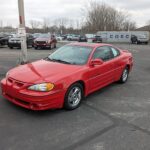Brake squealing, especially when cold, is a common concern for car owners. While some noise can be normal, persistent and loud squeaks can indicate an underlying issue. This article delves into a specific case with a 2023 BMW i4 eDrive 40, exploring the potential causes and solutions for cold brake squeal.
Cold Weather and Brake Squeal: A Common Culprit
One of the most common reasons for brake squealing is cold weather. Moisture can condense on the brake rotors overnight, leading to a thin layer of rust. This rust can cause friction and noise when the brakes are first applied in the morning. As the brakes warm up and the rust wears off, the squealing typically disappears. This is often considered normal and usually resolves itself. However, excessively loud or persistent squealing, even after the brakes have warmed up, warrants further investigation.
A BMW i4 Case Study: Persistent Squeaking
A 2023 BMW i4 eDrive 40 owner reported experiencing loud brake squealing starting at around 40 degrees Fahrenheit, worsening with decreasing temperatures. The noise was particularly noticeable during light braking and diminished with harder application. The dealership initially ground the brake pads, providing temporary relief. However, the squealing returned.
After a subsequent visit, the brakes were replaced. Unfortunately, the issue persisted. The regional BMW representative deemed the noise “normal,” attributing it to the break-in period of new brake pads, which could take up to 3,000 miles. This explanation was unsatisfactory to the owner, especially considering the absence of similar issues in their other, less expensive vehicles.
Possible Causes and Solutions: Beyond “Normal” Wear
While some brake noise can be attributed to normal wear and tear, particularly in cold weather, the persistent and loud squealing in this BMW i4 case suggests a more significant problem. Several factors could be at play:
- Brake Pad Material: Certain brake pad compounds, especially those with higher metallic content, are more prone to squealing.
- Pad and Rotor Compatibility: Incompatibility between the pad and rotor materials can lead to increased noise.
- Caliper Issues: Sticking or malfunctioning brake calipers can cause uneven pad wear and squealing.
- Installation Errors: Improper installation of brake pads or other components can contribute to noise.
The service technician acknowledged the possibility of a faulty pad design and recommended driving the car for another 1,000 miles before further action.
Addressing Brake Squeal: Seeking Expert Advice
Persistent brake squealing should never be ignored. If you’re experiencing similar issues, consult a qualified mechanic or your dealership’s service department. They can diagnose the problem and recommend appropriate solutions, which may include:
- Lubricating Brake Components: Applying specialized brake grease to specific contact points can reduce friction and noise.
- Resurfacing or Replacing Rotors: If the rotors are warped or damaged, resurfacing or replacement may be necessary.
- Replacing Brake Pads: Switching to a different type of brake pad with a lower metallic content may help.
- Addressing Caliper Issues: Repairing or replacing faulty calipers can resolve related squealing problems.
Conclusion: Persistence Pays Off
While some brake squeal, especially when cold, can be considered normal, excessively loud or persistent noise should be addressed. The BMW i4 case highlights the importance of advocating for proper diagnosis and solutions when faced with a potential vehicle defect. Don’t settle for “normal” if your brakes are consistently making concerning noises. Consult with qualified professionals to ensure your vehicle’s safety and optimal performance.

